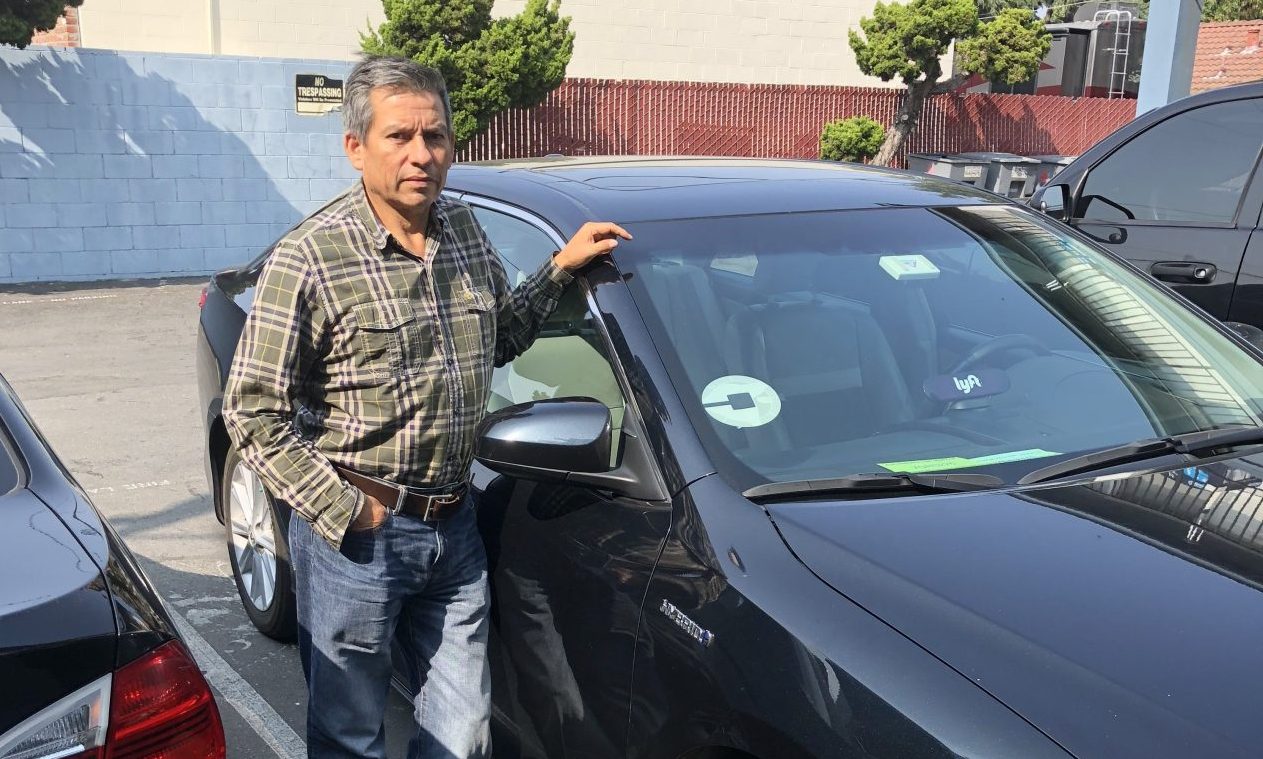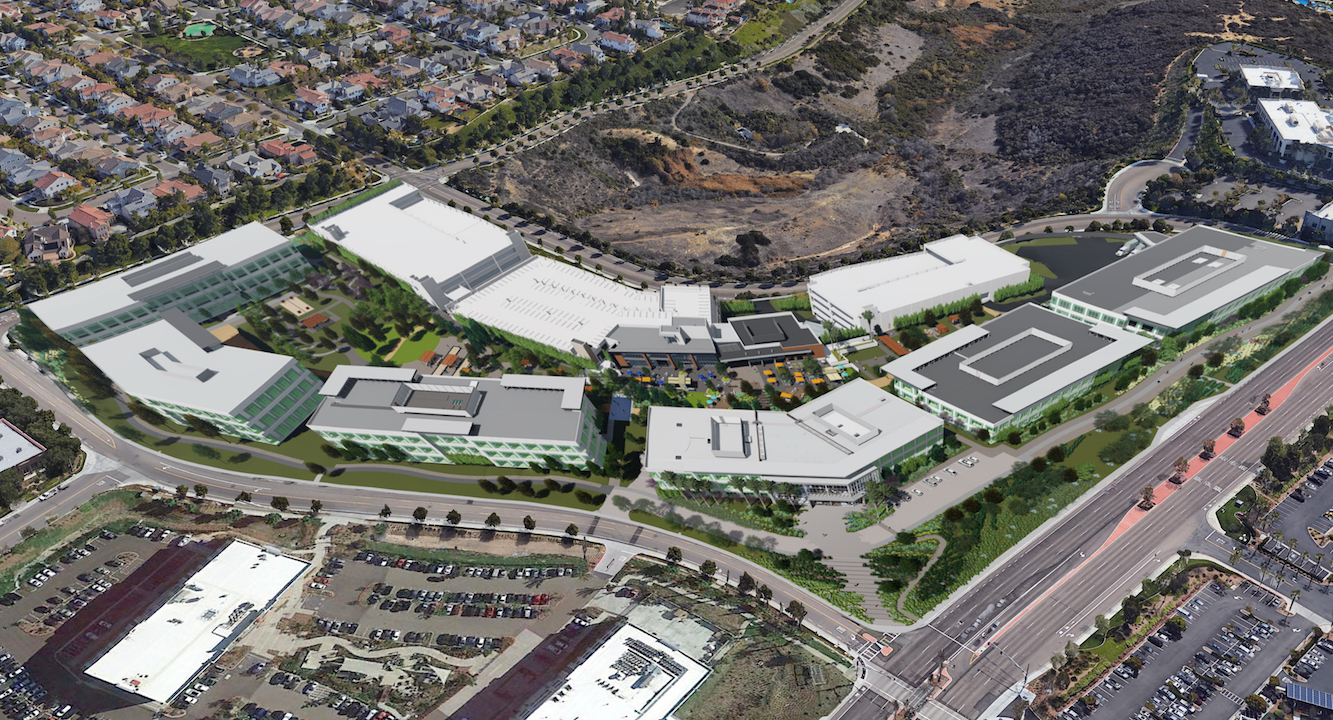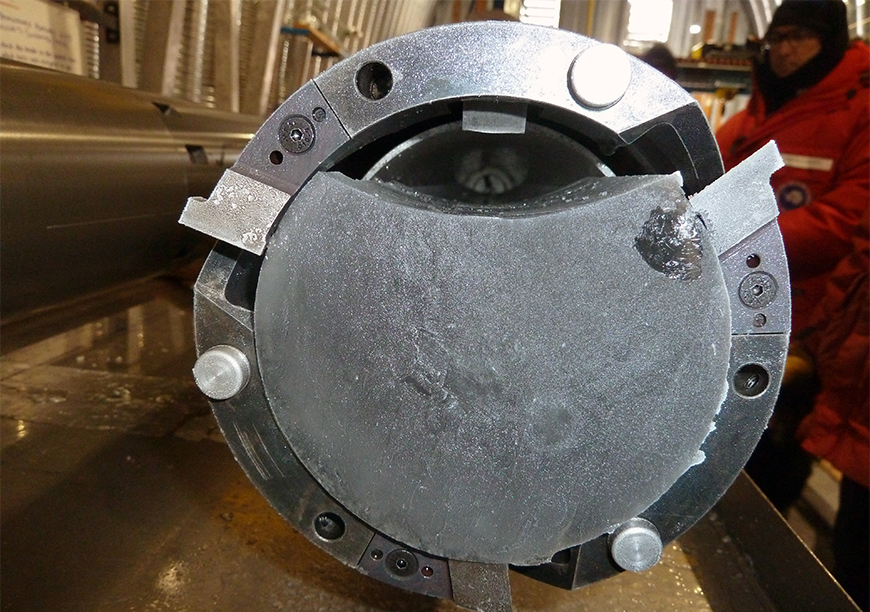Daily Business Report-Aug. 27, 2018
Edhuar Arellano has been driving for Uber and Lyft for four years. He says the companies should make drivers employees. (Photo courtesy of Edhuar Arellano)
As gig companies beg for relief
from pro-labor Supreme Court ruling,
the lobbying is fast and furious
By Antoinette Siu | CALmatters
For four years, Edhuar Arellano has left his house at 7 a.m. on weekdays to drive customers around the Bay Area for Lyft and Uber. Most days, he doesn’t get home to Santa Clara until 11 p.m. On weekends, he delivers pizzas to make ends meet.
Like a lot of drivers plugging in to ride-hailing apps for work, he likes the flexibility the gig economy has offered. But given the choice, Arellano says he wishes he could just become an employee. That would get him paid vacation, benefits, overtime, his own health insurance and perhaps more say over his working conditions.
“We need to accept whatever they want,” said the 55-year-old father of two grown children. “I can’t control anything.”
That quandary is behind a ferocious battle quietly playing out in the Capitol in the final days of the legislative session, which ends Aug. 31. Lobbyists for ride-sharing companies and the California Chamber of Commerce are scrambling to delay until next year (and the next governor’s administration) a far-reaching California Supreme Court decision that could grant Arellano’s wish—and, businesses fear, undermine the entire gig economy.
The April ruling, involving the nationwide delivery company Dynamex Operations West Inc. and its contract drivers, established a new test for enforcement of California wage laws, and made it much harder for companies in California to claim that independent contractors are not actually employees.
Though the ruling only applies to California, the state’s labor force is so huge that it has already had national impact. Shortly after the decision, U.S. Sen. Bernie Sanders of Vermont introduced a bill to make a version of California’s new rule the federal standard, a move that only added urgency to employers’ calls for state lawmakers to hit the pause button on implementing the ruling.
“Businesses are very concerned. The key is who’s going to be sued here in the near future,” said Allan Zaremberg, president of the California Chamber, which represents 50,000 businesses.
They should be, says labor leader Caitlin Vega, who has been similarly lobbying Capitol Democrats to refrain from meddling and let the Supreme Court decision move forward.
“Companies have made so much money already at the expense of workers,” Vega, the legislative director of the California Labor Federation said during a harried break between Capitol meetings. “We really see the Dynamex decision as core to rebuilding the middle class.”
State and federal labor laws give employees a wide range of worker protections, from overtime pay and minimum wages to the right to unionize. But those rights don’t extend to independent contractors, whose ranks have grown dramatically in the gig economy.
Apps such as Uber, TaskRabbit and DoorDash, which match customers and services online and in real time, have given workers an unprecedented ability to freelance but they also have blurred traditional employer-employee relationships and, labor advocates say, invited exploitation.
Some 2 million people, from Lyft drivers to construction workers, consider themselves independent contractors in California. In 2017, according to the Bureau of Labor Statistics, about one in 14 workers was an independent contractor nationally.
If state lawmakers don’t rewrite the law or stall its implementation for a few months, as businesses want—which the Legislature can legally do, though the clock is ticking—the Dynamex decision will subject businesses in California to a standard that is tougher than the federal government’s or most states’.
Known as the “ABC test,” the standard requires companies to prove that people working for them as independent contractors are:
A) Free from the company’s control when they’re on the job;
B) Doing work that falls outside the company’s normal business;
C) And operating an independent business or trade beyond the job for which they were hired.
That’s a high bar for the many companies whose bottom lines have depended on large numbers of contractors to deliver a particular service. According to the business lobby, in the months since the Dynamex decision, law firms have received 1,200 demands for arbitration and 17 class action lawsuits.
_______________________

New Horton Plaza owner to transform
center into a high-tech office complex
Stockdale Capital Partners has announced the acquisition of Horton Plaza and its plan to transform the existing property into The Campus at Horton, a vibrant mixed-use retail and creative high-tech office complex with a multitude of food and beverage, lifestyle retail and entertainment venues.
“We’re excited to create an iconic destination that will leverage the best of Downtown San Diego to create something high impact and truly unique,” said Steven Yari, managing director of Stockdale Capital, a real estate investment firm. “The Campus at Horton will be a thriving innovation hub, comprised of creative office space, captivating entertainment options, urban lifestyle retail choices and contemporary food and beverage experiences, catering to leading technology and biotechnology employers, locally and nationally.”
According to the developer, the center will include a bright and open boardwalk ornamented with boutique retail, green space and public seating areas, andwill run through the site and spill out onto a reactivated Horton Plaza Park which will offer multiple food and beverage options.
The Campus at Horton is expected to generate over $1.8 billion in annual regional economic activity annually and create 3,000-4,000 high-paying jobs for Downtown San Diego. The first phase of construction is expected to begin in early 2019 and be completed in fall 2020, with an opportunity for additional phases totaling 1.5 million of additional square feet to bring further density to the site.
“Stockdale’s plans for Horton Plaza are very exciting for Downtown San Diego,” said Ashley Gosal, In-house counsel for Bosa Development. “Our hope is that this project will serve as a catalyst for bringing high-tech tenants and thousands of jobs to downtown and spur other developments that will do the same.”
_______________________
San Diego companies flood Inc. 5000 list
San Diego Regional EDC
Earlier this month, Inc. magazine released its annual Inc. 5000 list of fastest-growing companies. More than 120 companies in the San Diego metro made the list, including EDC investor Innovative Commercial Environments. Other EDC partners on the list include Fuse Integration, Cloudbeds (which recently inked a partnership with Airbnb), Passion Planner, and more.
Notably, San Diego-based Scientist.com made the top 10, with 15,267.8 percent revenue growth. Scientist is a B2B marketplace that connects major pharmaceutical companies and the National Institutes of Health with research scientists.
The Inc. 5000 list ranks companies by revenue growth from 2015 through 2017 for companies that are U.S.-based, privately-held, for profit, and independent with 2017 revenues greater than $2 million. The 126 San Diego companies on the list totaled more than $2.4 billion in annual revenue in 2017.
This list shows San Diego’s businesses are gaining steam. While we’re home to one percent of the nation’s privately-held businesses, San Diego companies make up 2.5 percent of this year’s Inc. 5000 list.
Click here for the full list
_______________________
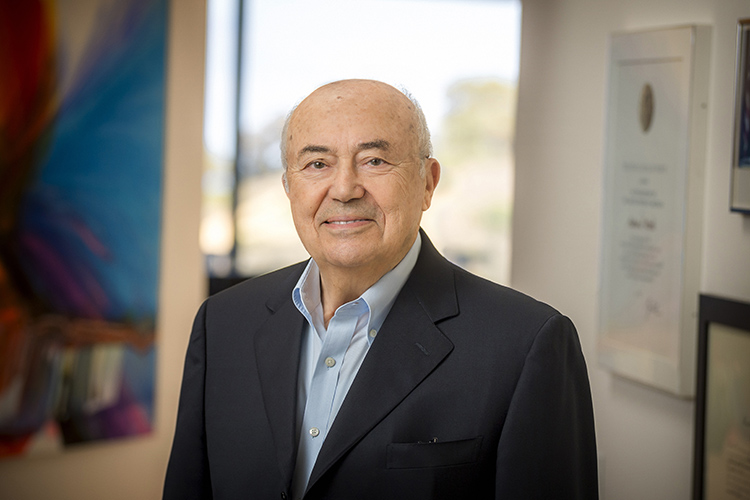
Communications pioneer gives
$50 million to UC San Diego
Andrew J. Viterbi, a renowned pioneer in the communications world, is creating a lasting legacy in health care through a philanthropic gift of $50 million to the University of California at San Diego. Inspired by his father, an ophthalmologist, Viterbi’s gift will name The Viterbi Family Department of Ophthalmology and The Viterbi Family Vision Research Center, and create six new endowed chairs for faculty. His support is dedicated to advancing research, education and eye care.
The gift contributes to the Campaign for UC San Diego, the university’s $2 billion fundraising effort.
“Our family has been in San Diego for 45 years. I’ve seen UC San Diego transform the city, the county and the southernmost region of California,” said Viterbi. “I’ve supported universities including MIT, Technion in Israel, USC and UCLA. And so it’s time for UC San Diego.”
Viterbi is a co-founder and retired vice chairman and chief technical officer of Qualcomm Inc. He is known in the wireless communications industry for the “Viterbi Algorithm,” which has forever changed the way people connect and communicate. Viterbi spent equal portions of his career in industry, having previously co-founded Linkabit Corporation, and in academia as an engineering professor—first at UCLA and then at UC San Diego, where he is now Professor Emeritus. He is currently president of the Viterbi Group, a technical advisory and investment company.
_______________________
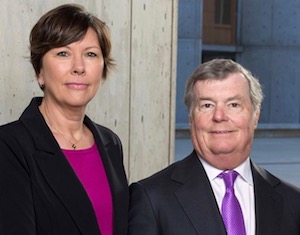
Salk Institute receives $2 million
for cancer research initiative
The Salk Institute announced a $2 million gift in support of its new Conquering Cancer Initiative from its current Board of Trustees Chair, Dan Lewis, and his wife, Martina Lewis. The funds will be used to advance the Salk Cancer Center’s highest research priorities, including new investigations into five of the deadliest cancers: lung, pancreatic, brain (glioblastoma), ovarian and triple-negative breast.
_______________________
Kratos completes 2nd phase
of Air Force ground services study
ExecutiveBiz
Kratos Defense and Security Solutions has completed the second phase of a nearly three-year, four-phase study that aimed to migrate a military satellite communications ground system to the U.S. Air Force’s Enterprise Ground Servicesarchitecture.
The company said it offered its EPOCH telemetry and command server and TAO-DSI platform, among other things, to automate data sources and deployment concepts and support schedule creation over the EGS message bus, as well as provide cloud services, such as Catapult and Webic, for the study.
The service intends to transfer the Command and Control Systems-Consolidated’s oversight of more than 20 milsatcom satellites to the EGS ground system to help the Air Force Space Command win battles in space.
“The transition from stovepiped ground systems to horizontally integrated architectures will optimize resources across space missions, enabling greater resiliency,” said Larry Lind, vice president of Kratos Federal Solutions Group. He added that the firm actively contributes to the EGS effort, extending its role beyond the CCS-C/EGS study.
Kratos completed the first phase of the ground system migration effort in February.
_______________________
Distinguished neuroscientist
to join Salk Institute
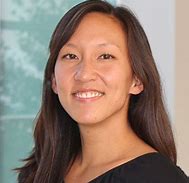
The Salk Institute announced that distinguished neuroscientist Kay Tye will join the Salk faculty in January 2019 as a full professor. She is currently an associate professor in the Department of Brain and Cognitive Sciences, Picower Institute for Learning and Memory, at the Massachusetts Institute of Technology.
Tye joins Salk’s mission by focusing on a wide variety of cutting-edge technologies and approaches to better understand the brain’s circuitry underlying emotion and motivation. Her discoveries are helping to pave the way for more targeted and efficient treatments for brain disorders, such as addiction-related behaviors, attention-deficit disorder (ADD), anxiety and depression.
Her appointment was made possible via the Rockstar Fund, founded in honor of Salk Board Chair Emeritus Irwin Jacobs to recruit high-profile scientists to the Institute.
_______________________
County grosses $7.5 million in property tax auctions
San Diego County Treasurer-Tax Collector Dan McAllister said his office sold 701 properties for $7.5 million during its two online property tax auctions this year. “For the second year now, our online auction platform has allowed us to sell more properties than ever before, which means these parcels will soon be back on the tax roll and generating money for the many services provided by the County,” said McAllister.
The Treasurer-Tax Collector’s Office (TTC) held a reoffer auction in July through an online format similar to e-Bay. The 691 offered properties were left over from the TTC’s initial online tax auction in May, during which the TTC grossed $3 million in sales.
“In this second round of bidding, we got 378 more properties off our tax-defaulted list and into the hands of buyers,” said McAllister. “Since the majority of properties were timeshares, we saw bidders from 17 states eager to buy a vacation spot in San Diego.”
_______________________
Personnel Announcements
Melissa Keylock joins San Diego North Coast Singers
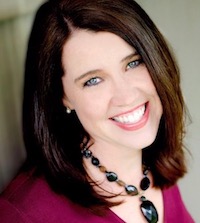
The San Diego North Coast Singers announced the selection of Melissa Keylock, a well-known composer/conductor, as the new associate artistic director.
Keylock has held leadership positions in some of the country’s finest children’s chorus organizations, including Princeton Girlchoir and American Boychoir School. She brings stellar expertise to the established youth chorus program. The singers regularly perform with the La Jolla Symphony and Chorus and this season will join the San Diego State University Department of Music and Dance for Bernstein’s MASS.
Keylock has worked at the Princeton Girlchoir, American Boychoir School, Rider University, and the Indianapolis Children’s Choir. She founded the annual Princeton Girlchoir Children Making a Difference benefit concert, raising over $30,000 for nonprofits. She previously taught public and private school, including K-12 vocal music and AP Music Theory. Throughout her career, Keylock has served in volunteer leadership positions with the American Choral Directors Association, where she recently was Eastern Division Repertoire and Resources Chair for Youth Choirs.
_______________________
Austin Pinder named head brewer at Bay City Brewing

Bay City Brewing Co. announced the hire of its new head brewer, Austin Pinder, who joins from Karl Strauss Brewing. Pinder brings more than a decade of professional brewing experience to the team. In his new role, Pinder plans to add more sour beers to Bay City’s portfolio, expand the brewery’s barrel-aging program and implement a quality assurance program to ensure consistency in the core beer lineup.
Prior to joining Bay City, Pinder got his start as the assistant brewer of the now defunct Firehouse Brewing Co., cleaning kegs and working the bottling line. After the brewery closed in 2011, Pinder took his talents to Karl Strauss, where he advanced from an assistant to senior brewer. At Karl Strauss, Pinder split his time between brewing at the company’s production facility in Pacific Beach and producing house beers and R&D batches at various brewpubs in and around Southern California.
“Our entire team impacts Bay City’s customer experience – from sourcing high-quality ingredients to our service at the bar,” said Pinder. “I’m committed to ensuring that experience includes the best quality beer possible, every single time.”
_______________________


